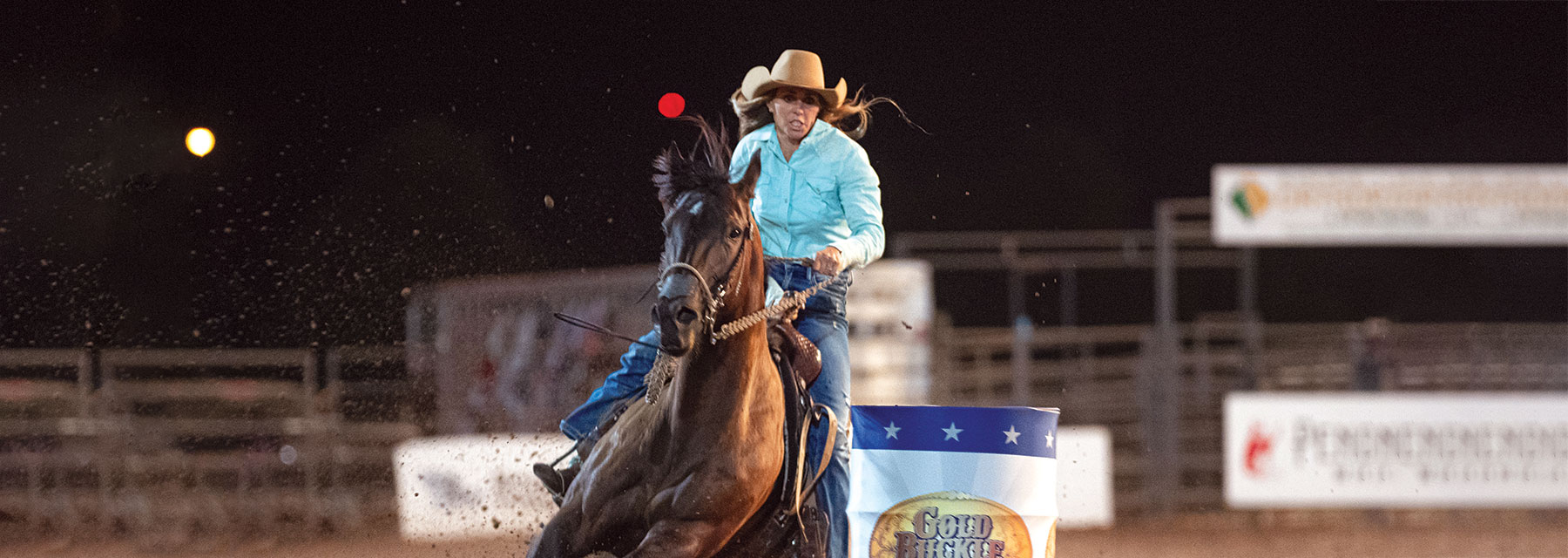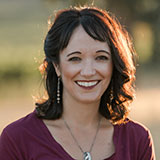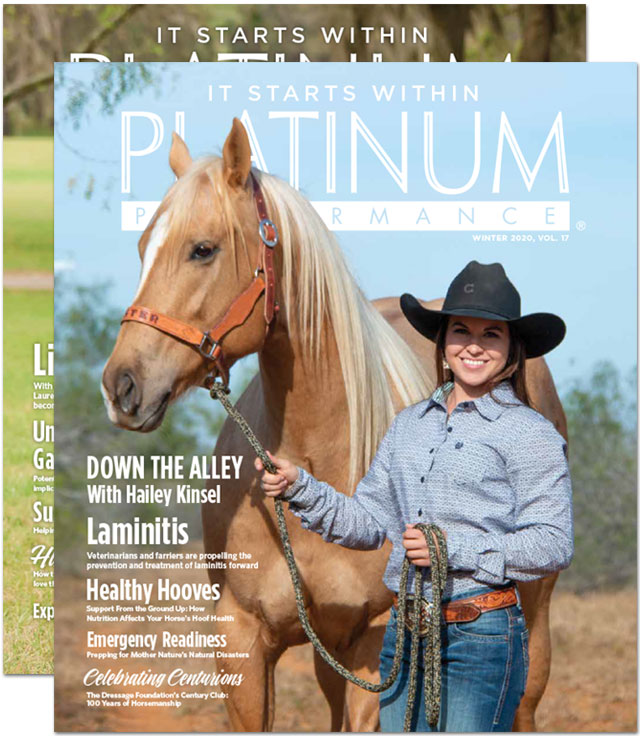Drs. Lindsey Horner, Leslie Schur and Ricci Karkula-Warnock Make A Living As Equine Veterinarians While Also Balancing Motherhood and Their Passion for Barrel Racing
“Choose a job you love and you will never have to work a day in your life.” This ageold adage still holds true for equine veterinarians Lindsey Horner, Leslie Schur and Ricci Karkula-Warnock. “I certainly have a passion for the horse and the effect they have on people. They draw people together, they hold families together, and it gives everyone a common goal,” explains Dr. Schur. “The relationships that I’ve had the ability to form over the years have been fantastic right alongside working with the most magnificent animal there is on the planet.” Dr. Horner continues, “I enjoy helping the people as much as their horse. It’s really rewarding when you’ve treated a horse for an injury to see him back in the arena winning with your client.” For successful veterinarians, their clients become more like family. Their goals become everyone’s goals and when the client wins, everyone celebrates. “For me, being a (reproduction) vet, I get to see someone’s dreams come to fruition,” says Dr. Karkula-Warnock. “I get to see the embryo first as a little black dot on the ultrasound and then the actual foal the next year. It’s just amazing for me, and it never gets old.”
These three remarkable women are living out their dreams as equine veterinarians, wives and mothers; however, their devotion to horses doesn’t stop there. The Western way of life is engrained into their souls and outside the clinic, they feed their desire running barrels alongside their clients. Says Dr. Schur: “We can continue to do the things that we love in this profession. It isn’t easy, but something worth doing is never easy.”
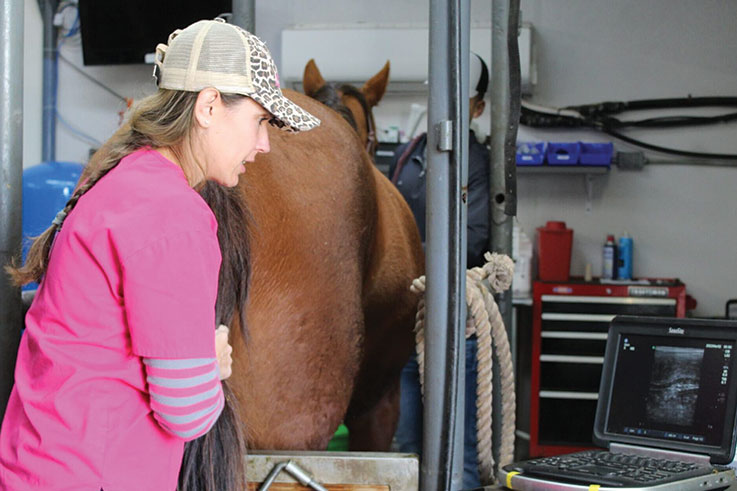
Dr. Ricci Karkula-Warnock preg-checks a mare at Brazos Valley Equine Hospital in Navasota, Texas.
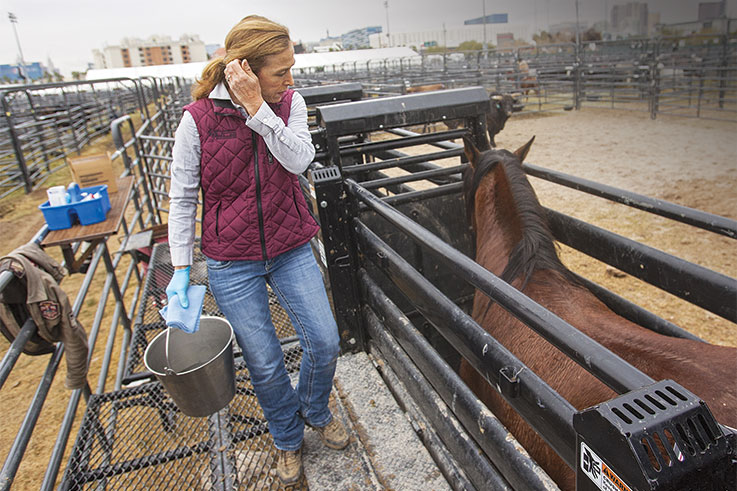
Dr. Leslie Schur has worked 27 Wrangler National Finals Rodeos as their on-call veterinarian.
A Love For Fast Horses
Most barrel racers at the professional level run barrels for a living; they don’t have another job to get home to after the rodeo, especially one as demanding as an equine veterinarian. This is what makes the stories of Drs. Horner, Karkula-Warnock and Schur even more unbelievable: they successfully practice medicine, raise families and win in a sport against barrel racers focused solely on competing. They go up against world champions, trainers and professionals throughout the country and are holding their own. Even though Dr. Schur has been sidelined with an injury this year and Dr. Karkula-Warnock has been sticking close to home, Dr. Horner has been representing them well in her circuit. Shyly she says, “I would say my biggest accomplishment is making the WPRA (Women’s Professional Rodeo Association) Badlands Circuit Finals. We have a pretty tough circuit with four of our local girls making the NFR (National Finals Rodeo).” In the WPRA, the country is split into 13 regions, or circuits, and every year each circuit holds a finals rodeo where the top 12 money earners compete against each other. It’s a coveted accomplishment many barrel racers only dream about and one that Dr. Horner should definitely be proud of.
Badlands Baddie
Lindsey Horner, DVM
Horner Equine in Dawson, North Dakota
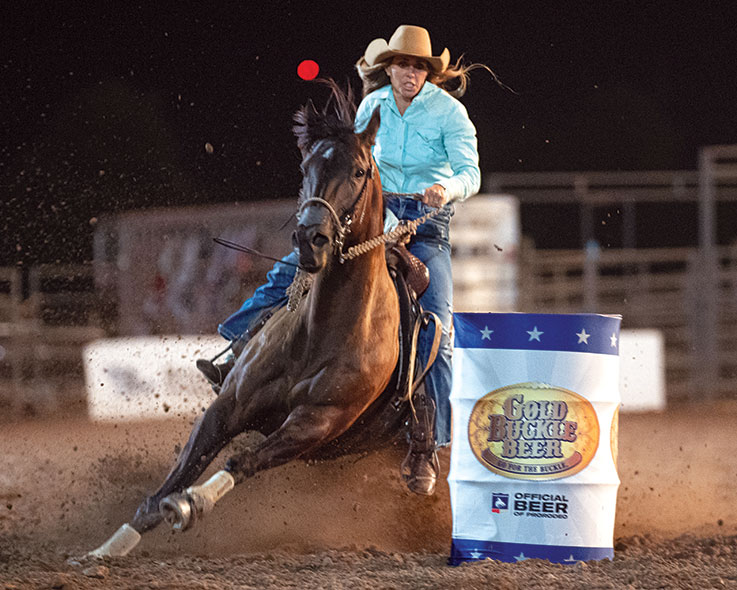
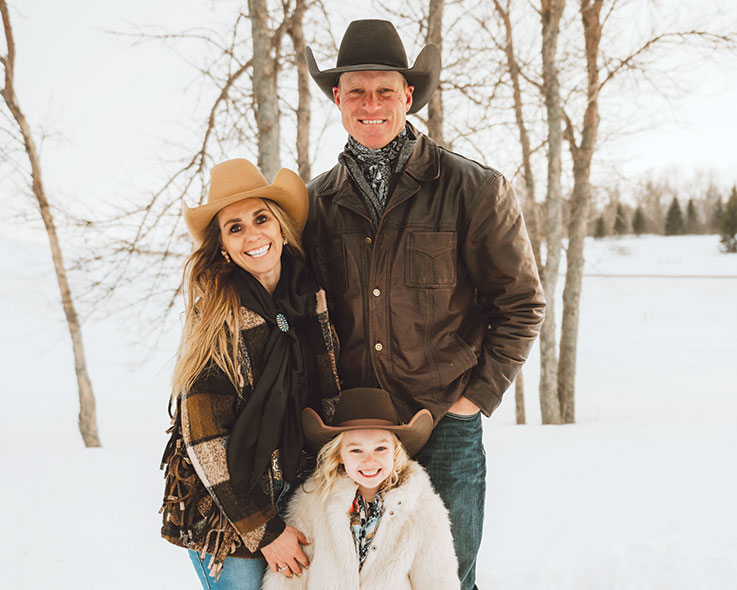
Dr. Lindsey Horner founded Horner Equine in 2012 with her husband Nathan, a licensed farrier and remains the sole practitioner in the clinic. In 2021, she qualified for the WPRA Badlands Circuit Finals.
COURTESY PHOTOS
Growing up in her father’s vet clinic, Dr. Lindsey Horner was raised to work with animals. “My father, Dr. Arlyn Scherbenske, is a vet, so I grew up around it my whole life working for him,” she says. “Veterinary medicine in general just always intrigued me, and I always knew I wanted to be a vet. But I didn’t necessarily want to work on cattle or small animals like he did; horses were my passion.” After graduating from Kansas State University, she spent a year in Weatherford, Texas interning at Reata Equine Hospital before moving back to Dawson, North Dakota, located on Interstate 94 between Fargo and Bismark, with her husband, Nathan, a licensed farrier, to open their own equine practice. “We decided to move back home to be closer to family and my husband’s ranch, and that’s how we built Horner Equine,” she says. Although starting the new practice was risky — there were no other equine-only clinics in the Peace Garden State — it worked out profoundly well for the Horners. “We came back at a good time when the horse industry was booming. And that really launched my career. I’ve been busier than I want to be pretty much ever since,” she explains. A woman wearing all hats, Dr. Horner will treat any equine ailment. “Basically, if it’s to do with a horse, other than a major orthopedic or colic surgery, I’ll do it,” she states. While treating lameness issues is her passion, she also provides a lot of reproductive and wellness services at her practice.
While Horner Equine continues to keep its sole practitioner busy, the couple finds peace out on the rodeo trail on weekends during the summer with their 5-year-old daughter, Karsyn. “We rodeo together and it’s honestly our little vacation when we go,” she says. “If we’re at home, we’re just always working, and we often do end up working some on the road too, but it’s still not as much as if we’re home. We really enjoy our time on the road as a family.”
True to her veterinarian nature of fixing things, Dr. Horner is drawn to horses that aren’t meeting their full potential on the barrel pattern. “I’m always tempted to buy project horses, and everyone’s always asking why I don’t just raise one and start from the beginning. But I’m too impatient for that,” she says. “I also always think I can fix everything medically.” Which many times, she can. Her best horse, Scar, came to her with a suspensory injury that she was told would need surgery. After purchasing the mare, she decided against surgery and chose to slowly rehab her instead. Scar came back stronger than ever and went on to run in the 1D, among the fastest horses in the race. “I made the circuit finals the first year I ran her, and I qualified for The American (Rodeo) on her,” Dr. Horner says proudly. Another sorrel in Dr. Horner’s string came to her with a gate issue from one of her clients. “At the time, I wasn’t even looking,” she jokes. After taking the horse anyway, she fixed the gate issue, and the mare is waiting in the wings to be her daughter’s future barrel horse. “I should really sell her because she’s not fast enough to be competitive at the level I want to be, but my little girl loves her,” she says. Karsyn is “not quite ready to run her yet by any means, but I think I’m just going to keep (the mare), so someday she can.”
The Repro Queen
Ricci Karkula-Warnock, DVM, MS, cVMA
Brazos Valley Equine Hospital in Navasota, Texas
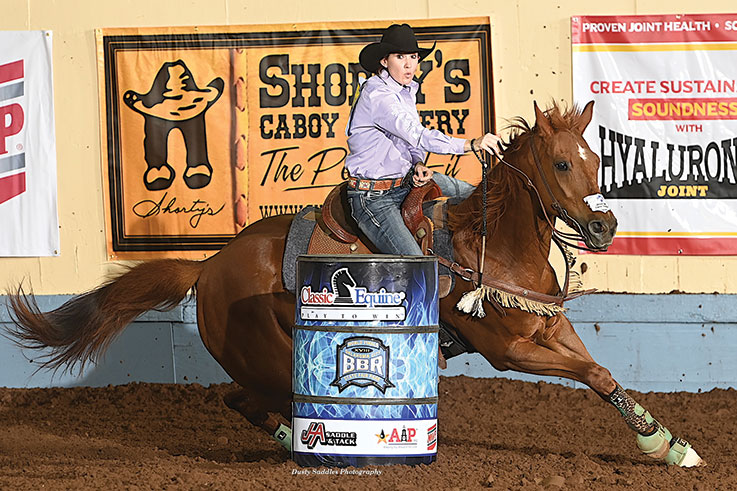
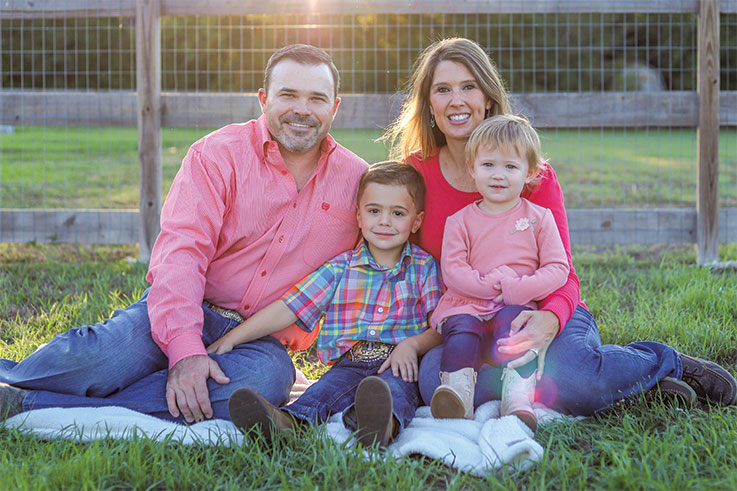
Dr. Ricci Karkula-Warnock runs barrels at the 2021 Better Barrel Races World Finals.
COURTESY PHOTOS
A California native now nestled in the heart of Texas, Dr. Ricci Karkula-Warnock is living the American dream. She works alongside her husband, Dr. Weston Warnock, at Brazos Valley Equine Hospital, a cutting-edge clinic treating some of the top performance horses in the country, located northwest of Houston near College Station. Her specialty is equine reproduction and, with a team of veterinarians and interns, they have the tools to do it all. She does everything from breeding mares with fresh, shipped or frozen semen to managing embryos for transfer, collecting local stallions and helping manage and problem solve for sub-fertile broodmares. Her job never stops during breeding season. It’s stressful work with timing being critical to success. “The kids have to come with me a lot during breeding season just because it is seven days a week,” she says. She feels fortunate to work in a family-oriented clinic that understands her struggles of working fulltime, being a mother and competitive barrel racer. “I work in a practice where our associates are always very willing to help me out, and we also have licensed interns that can do tasks like lavaging mares and administering plasma to foals after I leave.”
Her two children, 4-year-old Grayson and 2-year-old Adelyn, are becoming reproductive experts right alongside their mother. The lifestyle is busy and challenging, but seeing a positive pregnancy on the other end of the ultrasound makes all the hard work worth it.
Born and raised in Sanger, near Fresno in California’s San Joaquin Valley, Dr. Karkula- Warnock grew up on horseback. “My dad actually coached the rodeo team at Fresno State University when I was younger,” she says. As a child, she knew what she wanted to do. “In hindsight, I think I always wanted to be a repro vet because at 3 years old, I watched our neighbor’s mare give birth and just thought it was the greatest thing ever,” she says. After competing in high school and college rodeo, she did hang up her spurs while pursuing her veterinary license from Texas A&M University. “I didn’t start running again until after I graduated and, for me, just being able to go to barrel races has been the best fit.”
As a veterinarian specializing in reproduction, it’s no surprise she’s playing the long game while breeding and raising her own champion barrel horses. She’s currently running a mother-daughter team of mares all while flushing embryos out of them during breeding season. The first mare she raised, Marthas Bullion, or Pixie, is a 2005 model by the legendary Bully Bullion and out of a full sister to Marthas Six Moons, another renowned barrel horse sire. The mare is such a standout barrel horse that while Dr. Karkula-Warnock was sidelined from racing by her own pregnancies, she let her client and friend Jimmy Smith use her as a backup horse to qualify for the 2020 Wrangler National Finals Rodeo (WNFR). Luckily, Dr. Karkula-Warnock had already bred Pixie to Dash Ta Fame, the all-time leading barrel horse sire, and her foal Dash Of Pixie Dust, nicknamed Tinkerbell, is 11 and following right in her mother’s footsteps. “It’s been really fun,” Dr. Karkula- Warnock says. “I’m still running those two mares, and then we’ve bred them and have some yearlings and weanlings that we’re really looking forward to.”
On Call In Las Vegas
Leslie Schur, DVM
Desert Pines Equine Medical and Surgical Center in Las Vegas, Nevada
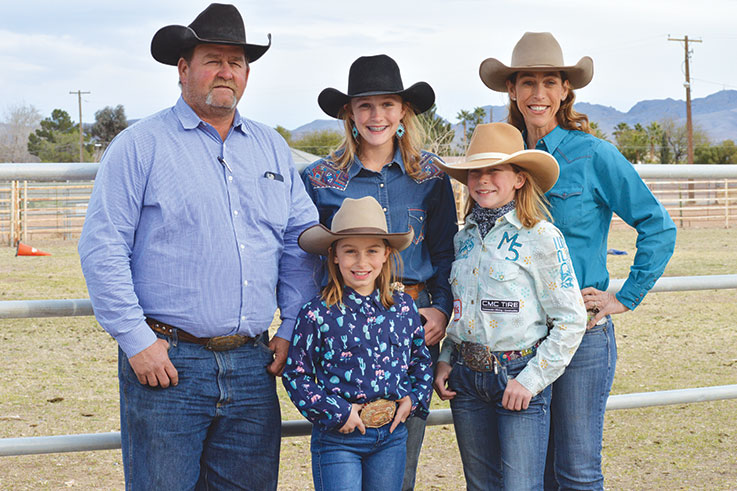
Dr. Leslie Schur, her husband, Darrell Moser, and their three daughters, Marquel, Lyndee and Reese.
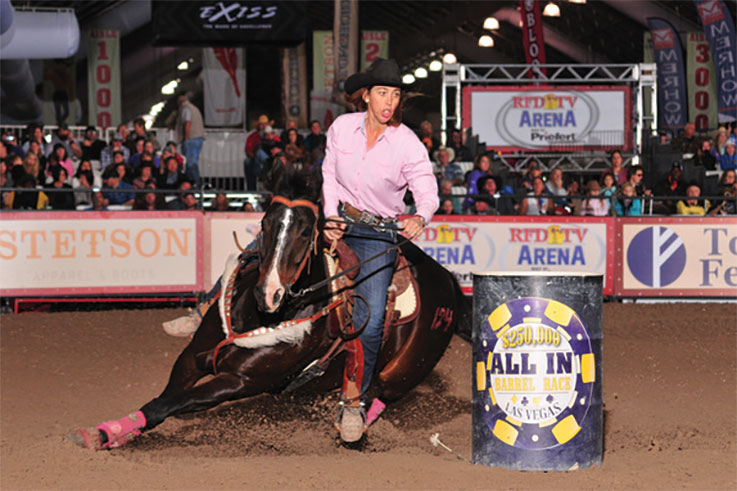
Dr. Schur competes at the coveted All In Barrel Race aboard her great mare, KG Cashin In On Beau.
Beyond the bright lights of the Las Vegas Strip is an entire horse community that participates in the large equestrian events hosted in the city. These huge productions attract hundreds of horses at a time and need an on-call veterinarian for their health and safety. That’s where Dr. Leslie Schur of Desert Pines Equine Medical and Surgical Center comes in. “Just this last month, I’ve worked out of the South Point Equestrian Center almost every day,” she says. Her job is key because not only does she help contestants if their horse is injured, she also helps manage and prevent the spread of any viruses should a horse become sick while at an event. “It’s tough for folks to be 1,000 miles from home and something go wrong with their horse, so we work hand in hand with their veterinarians at home just so the clients feel more comfortable as well,” she explains. One of the highlights of her year is the WNFR. “I’ve been blessed to be able to take care of the horses at the NFR pretty much my entire career. This will be my 28th year minus one year it was in Texas,” she states proudly.
Las Vegas hasn’t always been Dr. Schur’s home. She moved a few times before meeting her husband, Darrell Moser, and settling in Vegas to raise their three daughters, Marquel, Lyndee and Reese. She was born and raised in Snohomish, Washington, a city of about 9,000 people northeast of Seattle, where she knew at an early age what she planned to be. “From the time I was 4 or 5 years old, I always wanted to be a vet,” she said. She attended vet school at Michigan State University, then completed her internship at Arizona Equine Medical and Surgical Centre in Gilbert before moving to Las Vegas. Her daughters, now 14, 16 and 18, are also barrel racers. “I’m blessed that they all love horses,” she says. “It’s been a lot of fun raising them and going to the junior rodeos, jackpots and everything that went along with them sharing this passion.” For now, she is embracing the last few years with them all at home. “The blessing of having three, little-girl barrel racers is that I will come home from emergencies at 9:30 at night and the lights at the barn will still be on because somebody is out exercising my horse for me,” she explains. “It just doesn’t get any better than that.” Above her successful career, it is clear that family is most important in her eyes. “We may have a little bit of an unconventional life in our family. We don’t necessarily sit down to dinner very often, but we’re all in the barn and we’re all riding and cleaning stalls together, so that’s our family time.”
One downfall of having three barrel racing daughters is finding enough talented horses to go around. Her colleague and good friend Dr. Kathy Grimes, a WNFR qualifier herself, has been instrumental in helping build their herd. “I think we might have more horses with her brand than she does,” Dr. Schur jokes. Her good mare, KG Cashin In On Beau, or Jersey as she’s known around the barn, is a twin sister to Grimes’ WNFR horse Issy and has been very successful for the Mosers. “She’s my rock that I’ve rode forever, and my daughter (Lyndee ) has run her quite a bit as well. She’s probably won more money on her than I have,” she says. “When she was 11, she made the finals at the Salt Lake City WCRA (World Champions Rodeo Alliance) Rodeo and ran alongside Hailey Kinsel and Lisa Lockhart, so that was really fun for her.” In true veterinarian fashion, Dr. Schur has been breeding Jersey and has four foals that are coming of age to ride. Dr. Schur and her daughters are hoping the foals will turn out just as good as their mother and keep the family competitive for years to come.
“If you’ve got a passion and you’re going to have a successful career and dedicate yourself to both sides, then you have to work hard.”
— Dr. Leslie Schur
Why Nutrition Matters
Along with their tenacity and drive to succeed, the trio of talented veterinarians believe in the power of nutrition and have been using Platinum Performance® formulas to support their personal horses as well as their clients’ animals for many years. Dr. Horner was first introduced to Platinum while working at Dr. John Beug’s Red Lodge Veterinary Clinic in Montana before attending vet school, and she’s never looked back. “Once I started my own practice, it’s been the main supplement that I’ve used and promoted,” she says. “I really like the science behind it all, and there’s just no denying the results from it.” Dr. Horner uses an array of formulas on her own horses depending on their needs. “All my barrel horses are on it year-round,” she explains. “I use the Platinum Performance® GI or Platinum Performance® Equine depending on the horse. My bleeder has been on Platinum Skin and Allergy and Platinum Longevity®, and I also use the Vitamin E and Magnesium Citrate (formulas) on my hot-blooded ones.”
As for Dr. Karkula-Warnock, growing up in California only hours from where Platinum was founded, she’s been a believer since before she can remember. “I just grew up knowing about Platinum,” she says. “I started using it on my own horses after vet school because once I understood the nutrition component to it, Platinum was a no brainer.” Her favorite formulas include Platinum Performance® CJ, Healthy Weight and Platinum Hoof Support. “Overall health of the horse is really where it all starts and where we can ask them to perform at their best, and nutrition plays an absolute key role in that,” she says.
Dr. Schur agrees with her colleagues and preaches to her daughters that nutrition is important to their horses’ athletic performance. She says: “Nutrition is a huge part of keeping horses fit, not just as far as weight goes, but making sure that you’ve got their nutrients balanced, that you’re doing something to help them with their joints and that their immune system stays strong.” She had the unique privilege of working with Dr. Doug Herthel, the founder of Platinum Performance® in the early days of the company’s history. “In 1998, I had a mare that had a horrible 720-degree colon torsion and endotoxemia, and she ultimately did not eat for 31 days,” Dr. Schur explains. She reached out to Dr. Herthel because he had worked with this client, and he suggested feeding the mare a new formula that they were developing. “That was right before Platinum Enteral Immunonutrition Formula was developed, and that mare lived on being tubed with Platinum until she ate her first carrot on day 31,” she recalls. Seeing the results in this patient firsthand made a believer out of Dr. Schur who has used Platinum since.
